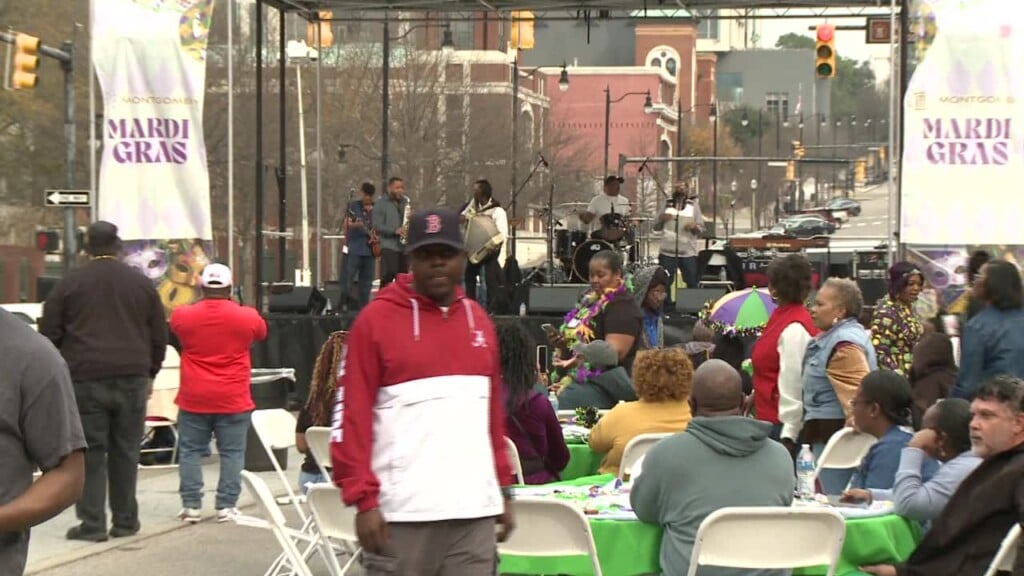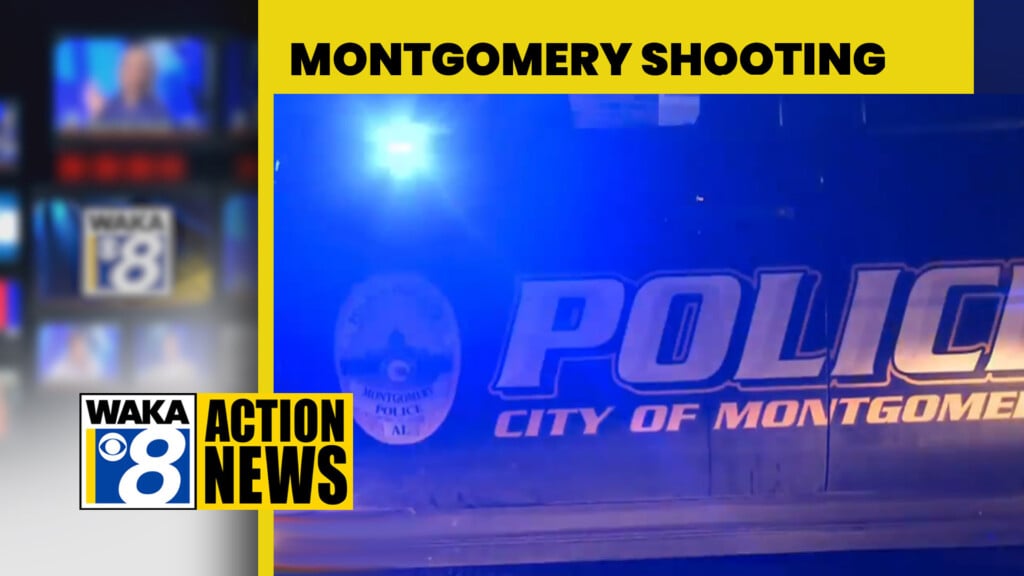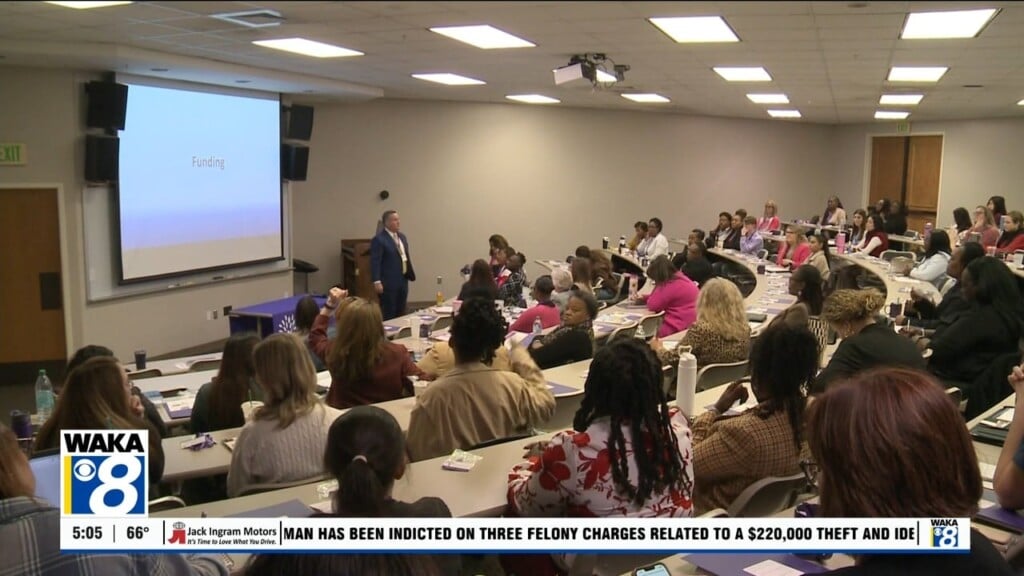U.S. Voting Rights Act signed 60 years ago, following Bloody Sunday in Selma

FILE – President Lyndon B. Johnson signs the Voting Rights Act of 1965 in a ceremony in the President’s Room near the Senate chambers in Washington, Aug. 6, 1965. Surrounding the president from left directly above his right hand, Vice President Hubert Humphrey; Speaker John McCormack; Rep. Emanuel Celler, D-N.Y.; Luci Johnson; and Sen. Everett Dirksen, R-Ill. Behind Humphrey is House Majority Leader Carl Albert of Oklahoma; and behind Celler is Sen. Carl Hayden, D-Ariz. (AP Photo, File)
The nation is marking the 60th anniversary of the Voting Rights Act of 1965. President Lyndon Johnson signed the landmark legislation into law on Aug. 6, 1965, months after marchers were beaten in Selma on what became known as “Bloody Sunday.”
It was March 7, 1965, that Charles Mauldin and other voting rights marchers who strode across the Edmund Pettus Bridge in Selma to be met by Alabama State Troopers. The violence that awaited them shocked the nation and galvanized support for the passage of the U.S. Voting Rights Act.

FILE – Selma Civil Rights foot soldier Charles Mauldin prepares to march during the 60th anniversary of the march to ensure that African Americans could exercise their constitutional right to vote, March 9, 2025, in Selma, Ala. (AP Photo/Mike Stewart, File)
Today, those who were at the epicenter of the fight for voting rights for Black Americans recalled their memories of the struggle, and expressed fear that those hard-won rights are being eroded.
Bloody Sunday in Alabama, 1965
Mauldin was 17 when he joined the ill-fated “Bloody Sunday” march. John Lewis, who became a longtime Georgia congressman, and Hosea Williams were the first pair of marchers. Mauldin was in the third pair.
“We had gotten past being afraid at that point. What was happening in Selma and to us was so unjust that we were determined to fight it regardless of the consequences,” Mauldin, now 77, said.

FILE – State troopers swing billy clubs to break up a civil rights voting march in Selma, Ala., March 7, 1965. (AP Photo, File)
Immediately, state troopers in gas masks and helmets, as well as deputies and men on horseback, attacked the marchers — men, women, children. They lashed out with billy clubs and tear gas, with stomping horse hooves and cattle prods.
A cause worth dying for
Richard Smiley, then 16, was also among the marchers. He stashed candy in his pockets so he would have something to eat in case they went to jail.
As they approached the bridge, he saw about 100 white men on horseback.
“The only qualification they needed was to hate Blacks,” Smiley said.
“Our knees were knocking. We didn’t know whether we were going to get killed. We were afraid but we weren’t going to let fear stop us,” Smiley, 76, recalled. “At that point we would’ve gave up our life for the right to vote. That’s just how important it was.”
Selma in 1965 was a “very poor city and a racist city,” he said. He said there were some “white people in the town that supported our cause, but they couldn’t stand up” because of what would happen to them.
Echoes of the past
The Voting Rights Act led to sweeping change across the South as discriminatory voting practices were dismantled and Black voter turnout surged. President Johnson called the act “a triumph for freedom as huge as any victory won on any battlefield,” when he signed it.
However, both Mauldin and Smiley see echoes of the past in the current political climate. While not as extreme as the policies of the Jim Crow era, Mauldin said there are attacks on the rights of Black and brown voters.
“The same struggle we had 61 years ago is the same struggle we had today,” Mauldin said.
Some states have enacted laws that critics say make it harder to vote, with voter ID requirements, limits to mail voting and other changes.
The Justice Department, once focused on protecting access to voting, is taking steps to investigate alleged voter fraud and noncitizen voting. The department is joining Alabama in opposing a request to require the state to get future congressional maps precleared for use, calling it “a dramatic intrusion on principles of federalism.”
A long, unfinished struggle
The fight for voting rights was a long struggle, as is the struggle to maintain those rights, said Hank Sanders, a former state senator who helps organize the annual Bloody Sunday commemoration in Selma that attract people from around the world, including U.S. presidents, presidential candidates, members of Congress and celebrities.
Two weeks after Bloody Sunday in 1965, the Rev. Martin Luther King led marchers on the walk to the Alabama Capitol in Montgomery to continue the fight for voting rights. Sanders was among the thousands who completed the last legs of the march and listened as King’s famous words “How long, not long” thundered down over the crowd.
“That was a very powerful moment because I left there convinced that it wouldn’t be long before people would have the full voting rights,” Sanders, 82, recalled. He said the reality it would be a longer fight set in the next year when a slate of Black candidates lost in an overwhelmingly Black county.
The Voting Rights Act for decades required that states with a history of discrimination — including many in the South — get federal approval before changing the way they hold elections. The requirement of preclearance effectively went away in 2013 when the U.S. Supreme Court ruled, in a case arising from Alabama, that the provision determining which states are covered was outdated and unconstitutional.
That led to a flood of legislation in states impacting voting, Sanders said. “It’s no longer a shower, t’s a storm,” Sanders said.
“I never thought that 50 years later, we’d still be fighting,” Sanders said, “not just to expand voting rights but to be able to maintain some of the rights that we had already obtained.”
Commemoration in Selma
The “Fight for the Vote” event is being held from 4-7PM today at Selma’s Civil Rights Memorial Park. Those joining in this celebration and recommitment to voting rights include Foot Soldiers and other leaders who fought on the front lines to secure voting rights for Americans, Sanders said. The program features live music, entertainment, and food; free school and arts supplies for children; youth performances; and prize drawings, including $500 awards and other prizes.
Sanders said this commemoration is made possible by a broad and diverse coalition of organizations, including Transform Alabama, Selma Bridge Crossing Jubilee, Southern Poverty Law Center, Alabama New South Coalition, S.O.S. Movement for Justice and Democracy, The Ordinary People’s Society, South Alabama Black Women’s Roundtable, Black Voters Matter, Selma Center for Nonviolence, Foot Soldiers Park, Alabama Democratic Conference, Rev Up Alabama, Whom It Concerns, Lift Our Vote, ACLU, ACIJ, Alabama Coalition on Black Civic Participation, The Democracy Centers and the National Voting Rights Museum.






